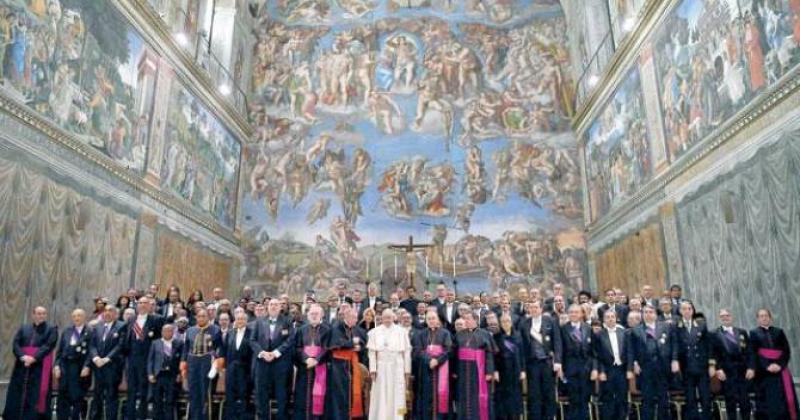His Holiness Pope Francis has paid tribute to the efforts exerted by Jordan in hosting the refugees, terming their hosting as falling within the framework of the spirit of brotherhood. This was reported in a speech delivered during his meeting Monday, January 7, with members of the diplomatic corps accredited to the Holy See on the occasion of the start of the New Year.
According to the statement issued by the Catholic Center for Studies and Media in Jordan, Fr. Dr. Rif’at Bader pointed out that the meeting of the Pontiff with members of the diplomatic corps accredited to the Vatican--or rather the Holy See as the Vatican is referred to in the international forums--is a meeting held annually at the beginning of the year during which the Pope reviews the achievements attained in past year and elaborates on the Vatican’s views with regards to the most important issues on the international arena as well as what he seeks to fulfill in the new year by urging the international community to find solutions to some of the ongoing conflicts and to meet the current humanitarian challenges.
Fr. Bader pointed out that Pope Francis touched in his address this year on several international issues, as he stressed the importance of joint action among countries to achieve justice and world peace by mentioning the Middle East in particular. In this context, His Holiness Pope Francis valued Jordan’s and Lebanon’s welcoming of great numbers of refugees “in the spirit of brotherhood” which entailed making great sacrifices. He also hoped that these refugees would return to their homes when suitable conditions prevail.
Pope Francis also renewed his call to the international community to work for a peaceful solution in Syria, as he referred to the wave of large-scale displacement caused by the war that affected neighboring countries. He also hoped for the resumption of peace negotiations between the Palestinians and the Israelis in order to reach agreement that takes into consideration the legitimate aspirations of the two peoples and stresses the attainment of the long-awaited two-state principle whereby both sides live side by side in peace and security. He also stressed the role of the international community to achieve these legitimate demands. Fr. Bader pointed out that Palestinian Ambassador to the Holy See Issa Kassissiyeh conveyed the greetings of Palestinian President Mahmoud Abbas to His Holiness Pope Francis and his commitment to the call made by His Holiness to resume negotiations on the basis of international legitimacy and the two-state solution.
His Holiness stressed the need to ensure the future of Christians in the Middle East and urged the concerned authorities to ensure the security and safety of Christians so that they can continue to live in their own countries as full citizens.
After referring to the common living prevailing between Muslims and Christians in various Middle Eastern countries, Pope Francis referred to his upcoming visit to the United Arab Emirates in February and to Morocco in March, pointing out that that they constitute an important opportunity to promote dialogue between religions and mutual recognition by the believers in the Islamic and Christian religions. He also recalled the historic meeting that took place 800 years ago in Egypt between St. Francis of Assisi and Sultan Kamel.
